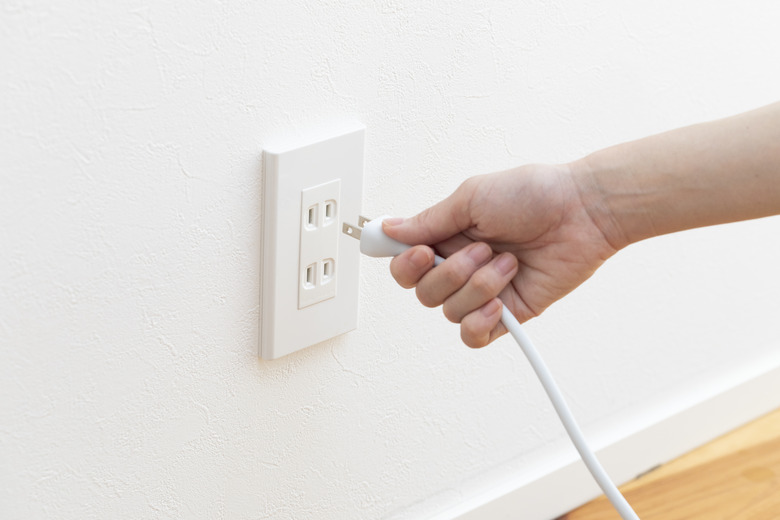What Is Hertz In Electricity?
You hear the term hertz in electricity as well as when discussing the transmission of electromagnetic waves – of which light and radio waves are examples – and the speed of computer processors. The common factor in all these phenomena is that they involve some type oscillation, and the hertz unit is used for measuring of the frequency of these oscillations. It has a simple meaning. One hertz is simply one cycle per second. It's usually written in its abbreviated form, which is Hz. Thus, instead of writing 100 cycles per second, scientists write 100 Hz.
The electricity that powers homes worldwide is known as AC – alternating current – electricity. Rather than flowing directly between a pair of terminals, AC current oscillates, and the number of cycles per second is expressed as hertz. The frequency of generated electricity isn't the same in every country, but it is a uniform 60 Hz throughout North America. In general, electromagnetic energy consists of oscillating waveforms, and the frequency of the oscillations, expressed as Hz, determines the characteristics of the radiation.
The Origin of the Hertz Unit
The Origin of the Hertz Unit
The hertz is named after Heinrich Hertz (1857–1894), a German physicist with credited with demonstrating the existence of electromagnetic radiation. His discoveries confirmed the theories established by James Clerk Maxwell and laid out in the four famous equations that established that light and heat are electromagnetic phenomena.
Along the way, Hertz was also the first researcher to confirm the existence of the photoelectric effect and the first to detect radio waves. Not a practical man, Hertz did not believe these accomplishments would have any use in the world, but in fact, they laid the groundwork for the modern wireless age. For all his accomplishments, the scientific world honored Hertz in 1930 by naming the unit of frequency after him.
Why is Generated Electricity Cyclical?
Why is Generated Electricity Cyclical?
Power stations around the world generate electricity by electromagnetic induction, a phenomenon discovered by physicist Michael Faraday and studied by physicists throughout the 19th century. The basis of this phenomenon is that a changing magnetic filed induces an electric current in a conductor. Generating stations make use of this principle by using steam to rotate a large conducting coil in a strong magnetic field. Because of the rotation of the coil, the generated electricity changes polarity with each rotation of the coil. It is known as alternating current, and the frequency of the polarity shift, measured in Hz, depends on the speed of rotation of the turbine.
The North American standard of 60 Hz goes back to Nikola Tesla, who engineered the first electric power station at Niagara Falls. Tesla discovered that 60 Hz was the most efficient frequency for energy distribution along power lines. In Europe and parts of Asia, where the standard frequency of AC current is 50 Hz, electricity transmission is 15 to 20 percent less efficient.
The Hertz Unit in Electromagnetic Radiation
The Hertz Unit in Electromagnetic Radiation
In any type of wave phenomenon, frequency and wavelength are reciprocal quantities. Because all electromagnetic radiation travels at the same speed – the speed of light – the frequency of the radiation goes down as the wavelength goes up. When developing the concepts behind quantum physics, Max Planck discovered that the energy (E) of a wave packet of light – a quantum – is proportional to its frequency (f). The equation is E = hf, where h is Planck's constant.
The radiation with the highest energy is that with the highest frequency, and it's often measured in megahertz (106 Hz), gigahertz (109 Hz) all the way up to peta hertz (1015 Hz). Radiation with frequencies in the petahertz range may exist in the cores of black holes and quasars, but not in the everyday terrestrial world of human beings.
Cite This Article
MLA
Deziel, Chris. "What Is Hertz In Electricity?" sciencing.com, https://www.sciencing.com/hertz-electricity-5838113/. 6 November 2018.
APA
Deziel, Chris. (2018, November 6). What Is Hertz In Electricity?. sciencing.com. Retrieved from https://www.sciencing.com/hertz-electricity-5838113/
Chicago
Deziel, Chris. What Is Hertz In Electricity? last modified March 24, 2022. https://www.sciencing.com/hertz-electricity-5838113/
